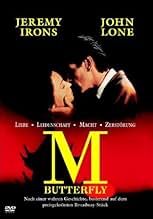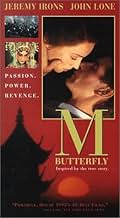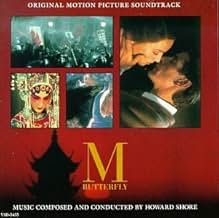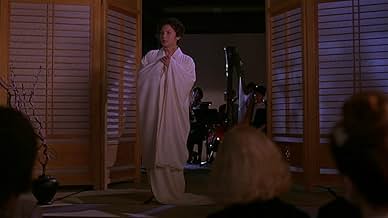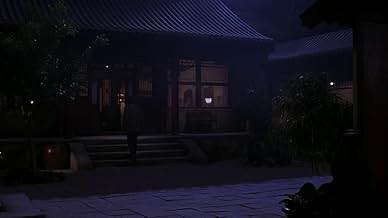AVALIAÇÃO DA IMDb
6,7/10
11 mil
SUA AVALIAÇÃO
Adicionar um enredo no seu idiomaIn 1960s China, French diplomat Rene Gallimard falls in love with an opera singer, Song Liling - but Song is not at all who Gallimard thinks.In 1960s China, French diplomat Rene Gallimard falls in love with an opera singer, Song Liling - but Song is not at all who Gallimard thinks.In 1960s China, French diplomat Rene Gallimard falls in love with an opera singer, Song Liling - but Song is not at all who Gallimard thinks.
- Prêmios
- 1 vitória e 1 indicação no total
Avaliações em destaque
This is David Cronenburg's best, based on a true story as bizarre and compelling as his other bizarre and compelling stories. John Lone is wondrous and Jeremy Irons is his usual cold, repressed upper class self. Perfect casting for a provocative director filming a moving story of love and loss.
Jeremy Irons and John Lone (who plays the character, Song Liling) should both have gotten academy awards for their performance in this incredibly enigmatic and captivating scorcher of a movie. This is a completely new twist on on the classic opera and may even be more of a believable story because it is so creatively wicked. It has a sexual tension that holds throughout the whole movie and is entirely played out in the mind and sensuously mesmerizing at the same time.
It's an emotionally tortuous journey that Jeremy Irons makes in the name of love (?), and more likely addicted passion. John Lone's performance is exceptional as one who is just as driven and hooked psychologically in his own way as what it is in him that drives him to fulfill Jeremy's ecstasy and descent into irretrievable madness.
Definitely one of the best movies ever! I hope this makes it to DVD sometime soon as it surely deserves to be seen again and again.
It's an emotionally tortuous journey that Jeremy Irons makes in the name of love (?), and more likely addicted passion. John Lone's performance is exceptional as one who is just as driven and hooked psychologically in his own way as what it is in him that drives him to fulfill Jeremy's ecstasy and descent into irretrievable madness.
Definitely one of the best movies ever! I hope this makes it to DVD sometime soon as it surely deserves to be seen again and again.
Jeremy Irons has specialised for many years in playing characters who build up a world of their own, and then have the world fall to pieces around them; who destroy themselves internally. This is the key characteristic for his parts in Damage, Cronenberg's Dead Ringers, Lolita (of course) and M. Butterfly. In this movie, however, it slightly misses the true impact of such events Irons has exhibited so well in those other parts, mainly because the final "revelation" actually doesn't happen until after Gallimard's world has already collapsed, with Butterfly's arrest (by the Red Guard, as an artist and thus a criminal) and his own recall to Paris. But he doesn't find out the truth about his Butterfly until the court case, where Irons is unable to react - he has to react without reacting, so to speak, and he just sits there looking as if he'd just bitten into a thistle. Were I to write the screenplay, I would have changed some of the order of events. It is not important to the movie that Gallimard learn of the true nature of his lover in the court room, so I would have that revelation earlier, thus completing the cycle of destruction we have seen in his life, and also avoiding that impossible ride in the police van near the end of the film. (First of all, it is impossible that two co-defendants in an espionage case would be transported together, secondly it is impossible that they be alone without a guard in the back, and thirdly it is quite impossible that the guards in the front of the van would not have noticed that one of the prisoners has taken off all his clothes!) Certain other elements also detracted from the movie. It does not do an avowedly art house film any good to Hollywood-ise things up by having Chinese people talk to Chinese people in heavily accented English.
And in the end, what was achieved? This case, as is pointed out in the film, was a national joke in France. Presumably Hwang didn't give the case the comedy treatment because he saw something deeper, something to learn about human nature. But in fact we learn very little about human nature that wasn't already obvious - the idea of subsuming one's whole being to an image of perfection; the inability to love the creator of an image if one has loved the image and discovered it to be nothing. All this is too obvious. Some merit might have been retrieved if it could be shown that Gallimard was intentionally deceiving himself, but that is clearly not the case.
An "ordinary" movie from David Cronenberg transpires to be almost too ordinary.
And in the end, what was achieved? This case, as is pointed out in the film, was a national joke in France. Presumably Hwang didn't give the case the comedy treatment because he saw something deeper, something to learn about human nature. But in fact we learn very little about human nature that wasn't already obvious - the idea of subsuming one's whole being to an image of perfection; the inability to love the creator of an image if one has loved the image and discovered it to be nothing. All this is too obvious. Some merit might have been retrieved if it could be shown that Gallimard was intentionally deceiving himself, but that is clearly not the case.
An "ordinary" movie from David Cronenberg transpires to be almost too ordinary.
M. BUTTERFLY continues to rank among the more important cinematic adaptations of a brilliant play - this one by the playwright David Henry Hwang. Having the pleasure to see two productions of the play - New York and Los Angeles - and viewing the film (1993) in the theater and on DVD brings an immense amount of satisfaction of just how fine this work is and continues to satisfy. The fact that David Henry Hwang wrote the screenplay suggests how true to the original the film is and how much of an impact it makes on the viewer
M. BUTTERFLY is based on a true story that stunned the world. During the Cultural Revolution in China in the mid-1960s, a French diplomat René Gallimard (a brilliant portrayal by Jeremy Irons) falls in love with a Chinese opera singer Song Liling (John Lone) - women were never allowed to sing in the Beijing Opera so the fact that Song is a man is credible. Song Liling touches him with a love as vivid, as seductive--and as elusive--as a butterfly. The love affair is so fragile and respectful that René does not suspect that Song is a man in disguise. René Is an important diplomat with the French Embassy, married to Jeanne (Barbara Sukowa), and is responsible for maintaining the high standards of diplomacy. Song Liling has been placed in the position of an undercover agent to gather secrets from the Embassy about the American plans in Vietnam. As René is promoted he demands to see his M. Butterfly without her clothes, an Song's only protection about her gender identity is to reveal that she is pregnant with René's child and must leave to be with her family until the child is born. As the Cultural Revolution heightens the French Embassy is to be diminished and it is discovered that René has been in a liaison with with a Chinese spy and is sent back to France to be imprisoned. When he is put on trial Song appears in Paris to be placed on the witness stand and since years have passed since their last meeting, Song attempts to offer herself once again to be René's Butterfly. Whether or not René's passion was a flight of fancy, it sparked the most vigorous emotions of his life. Only in real life could love become so unreal. And only in such a dramatic tour de force do we learn how a fantasy can become a man's mistress--as well as his jailer. In a desperately touching final scene we see the imprisoned René perform the final act from the opera that has accompanied this film - Puccini's MADAMA BUTTERFLY.
The story is at once compelling, explosive and slyly humorous, 'a work of unrivaled brilliance, illuminating the conflict between men and women, the differences between East and West, racial stereotypes--and the shadows we cast around our most cherished illusions.' The musical score by Howard Shore integrates arias and choruses from Puccini's opera with music from Chinese opera and his own sensuously beautiful original musical score. David Cronenberg directs with the tight amount of surreal disbelief the piece needs, but it is the brilliant acting of Jeremy Irons and John Lone that illuminate this film. It is a masterwork.
Grady Harp
M. BUTTERFLY is based on a true story that stunned the world. During the Cultural Revolution in China in the mid-1960s, a French diplomat René Gallimard (a brilliant portrayal by Jeremy Irons) falls in love with a Chinese opera singer Song Liling (John Lone) - women were never allowed to sing in the Beijing Opera so the fact that Song is a man is credible. Song Liling touches him with a love as vivid, as seductive--and as elusive--as a butterfly. The love affair is so fragile and respectful that René does not suspect that Song is a man in disguise. René Is an important diplomat with the French Embassy, married to Jeanne (Barbara Sukowa), and is responsible for maintaining the high standards of diplomacy. Song Liling has been placed in the position of an undercover agent to gather secrets from the Embassy about the American plans in Vietnam. As René is promoted he demands to see his M. Butterfly without her clothes, an Song's only protection about her gender identity is to reveal that she is pregnant with René's child and must leave to be with her family until the child is born. As the Cultural Revolution heightens the French Embassy is to be diminished and it is discovered that René has been in a liaison with with a Chinese spy and is sent back to France to be imprisoned. When he is put on trial Song appears in Paris to be placed on the witness stand and since years have passed since their last meeting, Song attempts to offer herself once again to be René's Butterfly. Whether or not René's passion was a flight of fancy, it sparked the most vigorous emotions of his life. Only in real life could love become so unreal. And only in such a dramatic tour de force do we learn how a fantasy can become a man's mistress--as well as his jailer. In a desperately touching final scene we see the imprisoned René perform the final act from the opera that has accompanied this film - Puccini's MADAMA BUTTERFLY.
The story is at once compelling, explosive and slyly humorous, 'a work of unrivaled brilliance, illuminating the conflict between men and women, the differences between East and West, racial stereotypes--and the shadows we cast around our most cherished illusions.' The musical score by Howard Shore integrates arias and choruses from Puccini's opera with music from Chinese opera and his own sensuously beautiful original musical score. David Cronenberg directs with the tight amount of surreal disbelief the piece needs, but it is the brilliant acting of Jeremy Irons and John Lone that illuminate this film. It is a masterwork.
Grady Harp
The shock and awe of his particular brand of horror might be what put Cronenberg on the map, but the qualities of any great director can't be boxed in by genre. This is decidedly the case with Cronenberg.
This seemingly straight forward spy drama, is the perfect framework for the Cronenbergian exploration of omnisexuality and man's ability to evolve beyond convention and conviction, into something uniquely other and uniquely beautiful. It's the emotional equivalent to his body horror movies, and as such distinctly different but nonetheless familiar.
Having seen all but his latest movie, I find it safe to say that David Cronenberg is the most fascinating and continually surprising director I have ever encountered. I simply love that crazy old guy.
This seemingly straight forward spy drama, is the perfect framework for the Cronenbergian exploration of omnisexuality and man's ability to evolve beyond convention and conviction, into something uniquely other and uniquely beautiful. It's the emotional equivalent to his body horror movies, and as such distinctly different but nonetheless familiar.
Having seen all but his latest movie, I find it safe to say that David Cronenberg is the most fascinating and continually surprising director I have ever encountered. I simply love that crazy old guy.
Você sabia?
- CuriosidadesDavid Cronenberg loved the play so much that when he heard a movie was being made about it, he volunteered immediately to direct it.
- Erros de gravaçãoThe word accordion is misspelled "accordian" in the closing credits.
- Citações
Song Liling: The days I spent with you were the only days I ever truly existed.
Principais escolhas
Faça login para avaliar e ver a lista de recomendações personalizadas
- How long is M. Butterfly?Fornecido pela Alexa
Detalhes
Bilheteria
- Orçamento
- US$ 17.000.000 (estimativa)
- Faturamento bruto nos EUA e Canadá
- US$ 1.498.795
- Fim de semana de estreia nos EUA e Canadá
- US$ 57.280
- 3 de out. de 1993
- Faturamento bruto mundial
- US$ 1.498.795
- Tempo de duração1 hora 41 minutos
- Cor
- Mixagem de som
- Proporção
- 1.85 : 1
Contribua para esta página
Sugerir uma alteração ou adicionar conteúdo ausente



